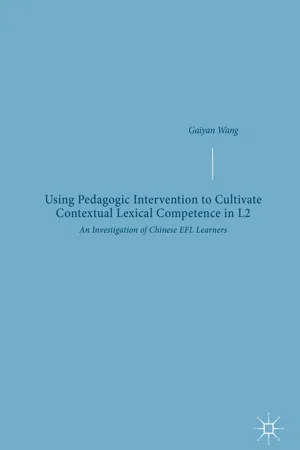1.2.1 Controversies Over Vocabulary Learning With/Without Context
It ca n be s afely stated that all L2 learners and their teachers are well aware of the fact that learning a second language involves learning large numbers of words, that is, individual words and formulaic language. Not surprisingly, many learners are somewhat apprehensive when faced with the enormous task of enlarging their vocabulary size to a satisfactory level. Researchers and teachers, as well as learners, have always shown a keen interest in finding out how words can best be learned, in their contexts of use or out of their contexts of use. Moreover, if contextual vocabulary learning is preferred to context-free vocabulary-list memorization, what contexts are more helpful—enhanced contexts or natural contexts?
Taken out of context and put into a separate list, words can be learned (i.e., memorized) more directly on the basis of bilingual translations, simple explanations of their meanings, synonyms and antonyms, and so forth. Memorizing voc abulary lists can quickly enlarge learners’ vocabulary size, which is usually understood as the number of words whose form-meaning mappings are correctly remembered. This ability has been widely accepted as the indicator of L2 learners’ level of vocabulary knowledge (Nation 2001), although vocabulary knowledge is still a quite vague and complex concept. Many studies have found a positive correlation between learners’ vocabulary size (as measured by the number of memorized form-meaning mappings of words) and other language skills, typically, reading comprehension (Loewen and Sato 2017). But Nagy and Anderson (1984) described the futility of learning individual words given the massive number of words students need to know in order to comprehend, for example, school texts. Some vocabulary researchers have addressed this concern by arguing that it is critical to determine which words are most important to learn directly (Graves 2015; Nagy and Hiebert 2010). Recently, scholars have argued for learning sophisticated academic words that occur across school contexts (Beck et al. 2013). Yet, it remains unclear whether it is possible for students to learn enough of these academic words to broadly impact their reading comprehension (Wright and Cervetti 2017). The nature of the relationship between vocabulary knowledge and comprehension is not entirely understood, but most researchers agree that directly memorized word knowledge (i.e., form-meaning mappings) is not enough. Word meanings learned directly cannot be easily retrieved from memory in real communicative contexts (McKeown and Beck 2014).
To speed up access to word meanings in the reading context, some researchers suggest learning words in their context of use. But complex contextual information can divert learners’ attention from learning words and reduce vocabulary-learning efficiency. To enhance vocabulary learning, some researchers (Nagy 2005; Stanovich 1986) suggest that context be purposefully modified by adding glosses to provide paraphrases, synonyms and antonyms, and so on. Research has proven improved retention of words learned in enhanced contexts owing to deeper processing of their meanings (Nation 2015; Ender 2014; McKeown and Beck 2014). But whether learners’ access to memory in new contexts can be speeded up or not is still not clear (Wright and Cervetti 2017). And, similar to the problems faced by direct vocabulary learning, words that can be learned in enhanced contexts are also quite limited in number. Finally, which words should be learned in enhanced contexts is also controversial (Schmitt 2010; Wright and Cervetti 2017). Yet, in spite of the problems and arguments, vocabulary learning in enhanced contexts is the focus of L 2 vocabulary research.
Compared with the enormous amount of research on vocabulary learning in enhanced contexts, research on vocabulary learning in natural contexts is scarce (Wesche and Paribakht 2010; Haastrup 1991). But as a matter of fact, most intermediate or more-advanced level L2 learners (especially L2 learners at the university level) learn words mainly in natural contexts, namely, contexts without external helps (i.e., glossaries, added exposures, dictionaries or teachers). In these contexts, new words can only be learned through lexical inferen cing (Wesche and Paribakht 2010). However, careful examination of the related literature reveals that contextual vocabulary learning in natural contexts has, to a great extent, been confused with vocabulary learning in enhanced contexts in terms of the lexical knowledge expected to be learned and the goal of vocabulary learning in context. In both contexts, the lexical knowledge to be learned consists of form-meaning mappings of the target words, and the goal of learning is retention of the form-meaning mappings. Moreover, the lexical meanings mapped with certain lexical forms in both contexts are checked with dictionaries.
Vocabulary learning in natural contexts is assumed to be more time-consuming and challenging for L2 learners than either vocabulary learning in enhanced contexts or direct vocabulary learning. Despite the differences in the presence/absence of context and in the way contexts are used, they have the same purpose of facilitating vocabulary learning. Yet no systematic research has been conducted to disentangle the complexity of their relat...
